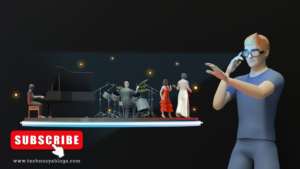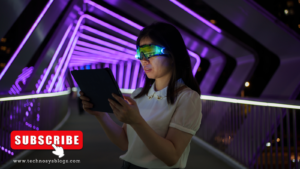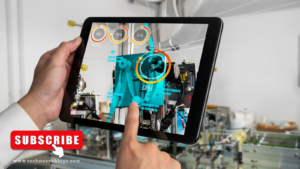Introduction: Decoding the Metaverse

In recent years, the term “metaverse” has transitioned from science fiction to a tangible concept, rapidly shaping our virtual future. With technological advancements pushing the boundaries of what’s possible, the metaverse is no longer confined to the realms of imagination but is becoming an integral part of our digital landscape. In this blog, we’ll dive deep into the world of the metaverse( Decoding the Metaverse), exploring its implications, the technological innovations driving its evolution, and the potential disruptions it may bring to various industries.
Understanding the Metaverse
The metaverse can be described as a collective virtual shared space, created by the convergence of multiple interconnected virtual environments, augmented reality, and the internet. It’s a digital realm where users can interact with each other and digital objects in real-time, blurring the lines between the physical and virtual worlds.
Implications of the Metaverse
1. Social Interaction
One of the most profound implications of the metaverse is its impact on social interaction. With virtual worlds becoming increasingly immersive and realistic, people can connect, socialize, and collaborate in ways never before possible. From virtual meetings to attending concerts or exploring virtual cities with friends, the metaverse offers endless opportunities for social engagement.

2. Economic Opportunities
The metaverse presents new economic opportunities, ranging from virtual real estate development to creating and selling digital assets. Just like in the physical world, virtual spaces within the metaverse can be bought, sold, and developed, opening up avenues for entrepreneurship and innovation.

3. Education and Training
In the metaverse, traditional methods of education and training are being revolutionized. Virtual classrooms, simulations, and immersive learning experiences are reshaping how we acquire knowledge and skills. From medical training to corporate workshops, the metaverse offers a dynamic and interactive learning environment.

4. Entertainment and Gaming
Gaming has long been at the forefront of virtual experiences, and the metaverse is taking it to new heights. With photorealistic graphics, immersive storytelling, and social interaction, virtual worlds within the metaverse are becoming the next frontier of entertainment. From massive multiplayer online games to virtual theme parks, the possibilities are endless.

Technological Innovations Shaping the Metaverse
1. Virtual Reality (VR)
VR technology plays a crucial role in creating immersive virtual environments within the metaverse. With advancements in hardware and software, VR headsets are becoming more affordable and accessible, allowing users to experience the metaverse in stunning detail.

2. Augmented Reality (AR)
AR technology overlays digital content onto the real world, enhancing our perception of reality. From smartphone apps to AR glasses, AR is blurring the lines between the physical and virtual, enriching our everyday experiences.

3. Blockchain and NFTs
Blockchain technology enables the creation and ownership of unique digital assets, known as non-fungible tokens (NFTs). In the metaverse, NFTs are used to represent digital art, virtual real estate, and other unique items, providing creators with new monetization opportunities and ensuring ownership rights.

4. Artificial Intelligence (AI)
AI powers virtual environments within the metaverse, making them more dynamic and responsive. From chatbots to virtual assistants, AI-driven technologies enhance user experiences and enable realistic interactions within virtual worlds.

Potential Disruptions in Various Industries
1. Real Estate
The concept of virtual real estate within the metaverse challenges traditional notions of property ownership. As virtual spaces gain value and significance, real estate developers and investors are exploring opportunities to buy, sell, and develop virtual properties, creating a new digital economy.
2. Retail and E-Commerce
The metaverse is reshaping the retail landscape, offering immersive shopping experiences that go beyond traditional e-commerce platforms. Virtual stores, virtual try-ons, and interactive product demonstrations are redefining how consumers engage with brands and make purchasing decisions.
3. Healthcare
In the metaverse, healthcare professionals can conduct virtual consultations, simulations, and training sessions, improving access to care and medical education. From telemedicine to virtual rehabilitation, the metaverse has the potential to transform healthcare delivery and patient outcomes.
4. Travel and Hospitality
Virtual tourism is emerging as a lucrative industry within the metaverse, allowing people to explore exotic destinations from the comfort of their homes. Virtual hotels, resorts, and travel experiences offer a glimpse into the future of travel and hospitality, catering to a growing demand for immersive and personalized experiences.
Conclusion
As technology continues to evolve, the metaverse is poised to become an integral part of our digital future. From social interaction to economic opportunities, the implications of the metaverse are vast and far-reaching. By embracing technological innovations and exploring the potential disruptions, we can unlock new possibilities and shape a virtual future that is inclusive, immersive, and transformative.
The journey into the metaverse has just begun, and the possibilities are limitless. Are you ready to decode the metaverse and shape our virtual future?
